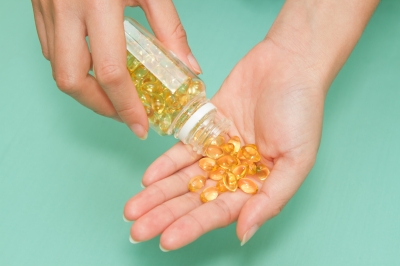Supplements – How to Pick a "Whole Food" Supplement for Optimal Health
If you strive for optimal health, consider adding a whole food supplement to your daily regimen. However, you must be a savvy shopper to make sure you select a supplement that lives up to its claims. . .many are a waste of money! Things to look for:
1. Independent research – This means the company selling the product did not conduct the research.
2. Double blind, placebo controlled studies – This means neither the “patient” nor the doctor knew if they were taking the supplement or a sugar pill. Provides more reliable results.
3. Research that shows results – If the product claims to raise antioxidant levels and reduce high blood pressure then research studies need to back this up.
4. Publication in peer reviewed journals, such as The Journal of the American College of Cardiology or the Journal of Human Nutrition and Dietetics.
All the best,
Lisa Nelson RD
Juice Plus
How to Use Calcium to Lower Blood Pressure

The link between calcium and blood pressure was noticed years ago when researchers realized people drinking hard water had less high blood pressure than those drinking soft water. Hard water contains more minerals, including calcium.
Individuals receiving more than 800 mg of calcium daily have a 23 percent decreased risk of high blood pressure versus those consuming less than 400 mg of calcium per day.
Back in 1996, scientists compiled all the research to date on calcium and high blood pressure. The results showed calcium supplements given to individuals with high blood pressure lowered systolic blood pressure (top number) an average of 4.3 mm Hg and diastolic blood pressure (bottom number) 1.5 mm Hg.
Some people respond better to supplemental calcium than others. Those with the best results include African-Americans, elderly, pregnant women, menopausal women, people with salt-sensitivity, individuals with a high sodium intake, and those with Type II diabetes.
For the best results, don’t rely on a supplement alone. Work to increase your intake of calcium containing foods – dairy. To promote heart health, select low fat dairy products, such as low fat milk, cheeses, and yogurts.
Additional calcium sources:
Leafy greens (i.e. kale, collard, turnip, mustard greens)
Broccoli
Sardines
Canned Salmon
Calcium fortified Orange Juice
Tofu (if made with calcium carbonate)
For even better results, supplement calcium along with vitamin D. One study supplemented women 1200 mg of calcium to reduce blood pressure. When they added 800 IU of vitamin D, systolic blood pressure decreased an average of 9.3 percent.
Don’t forget three other minerals affect how effective calcium – potassium, magnesium, and sodium. For calcium to have the greatest positive effect on blood pressure, your levels of these three nutrients need to be adequate as well.
For additional steps to lower blood pressure, check out the free e-course 7 Naturals Ways to Lower Blood Pressure.
All the best,
Lisa Nelson RD
Image courtesy of alex_ugalek at freedigitalphotos.net
Heart Health – Is fish oil safe?

Fish oil supplements are a great alternative for people that do not eat fish often to boost their omega 3 intake and promote heart health.
There’s been some media speculation about possible contaminants, such as mercury, within fish oil supplements. However, good news if you supplement fish oil, there are minimal contaminants within the supplements!
There have been several studies, specifically a report by ConsumerLab.com and Harvard Medical School, finding no mercury or PCBs within over 40 popular fish oil supplements. Fish oil is typically taken from fish, such as cod and sardines, that do not contain high levels of mercury. Also, many manufacturers distill the fish oil to remove contaminants.
All the best,
Lisa Nelson RD
Image courtesy of Praisaeng / FreeDigitalPhotos.net
Lower Cholesterol – Is grapefruit juice safe with medications, such as Lipitor?
 Here’s another question I asked Dr. Cynthia Shelby-Lane and her answer.
Here’s another question I asked Dr. Cynthia Shelby-Lane and her answer.
Lisa Nelson RD: Is it safe for individuals taking medication for heart disease, such as Lipitor, to eat grapefruit or drink grapefruit juice?
Dr. Shelby-Lane: I am including information that may help answer your question about grapefruit and a variety of nutritionals that affect statin drugs for the lowering of cholesterol.
Zocor (Simvastatin), for example, is a Statin drug, used to lower high cholesterol levels, and also known as HMG-CoA reductase inhibitor. Zocor may affect the absorption or utilization of vitamins E and coenzyme Q10. Tests showed the average concentration of coenzyme Q10 in blood plasma decreased by approximately 50% after statins were used for 30 days. Supplementation is considered beneficial.
Grapefruit and grapefruit juice may increase the effects of HMG-CoA reductase inhibitors and should not be consumed at the same time. It is suggested that these medications be taken with water. Grapefruit contains substances that may inhibit the body’s ability to break down statin drugs increasing the toxicity of the drug. Muscle pain, tenderness, or muscle weakness may be a result. If you begin to notice these symptoms, contact your doctor.
Niacin is the form of vitamin B3 used to lower cholesterol. Large amounts of niacin taken with a statin drug may cause serious muscle disorders (myopathy). Reasonable levels of niacin combined with statin drugs have been shown to enhance the cholesterol lowering effect. For proper dosage, consult your physician before taking niacin.
Pomegranate juice has been shown to inhibit the same enzyme inhibited by grapefruit juice. This may cause reactions similar to grapefruit juice when it is used with statin drug treatments.
A study of 37 people with high cholesterol treated with diet and statin drugs found vitamin A increased in the blood over two years of therapy. People taking statin drugs and vitamin A supplements should have blood levels of vitamin A monitored.
Magnesium and aluminum containing antacids were reported to interfere with statin drug absorption. To avoid this interaction, take statin drugs two hours before or after any aluminum/magnesium containing antacids. Some magnesium supplements such as magnesium hydroxide are also antacids.
It should be noted that doctors often recommend supplementing with 100 mg of coenzyme Q10 per day for maintaining healthy levels. However, those on statin drugs may have a greater need for a higher dose. It further should be noted that the symptoms associated with the combination of grapefruit juice and statin drugs (muscle weakness and discomfort) are commonly reported as symptoms associated with CoQ10 depletions. Supplementation with coenzyme Q10 is strongly recommended.
The herbs Artichoke plant, Garlic and Plantain may decrease blood cholesterol levels, and therefore enhance the effects of Zocor. Consult with your pharmacist or physician before taking them.
All the best,
Lisa Nelson RD
Be Heart Healthy and Lose Weight



